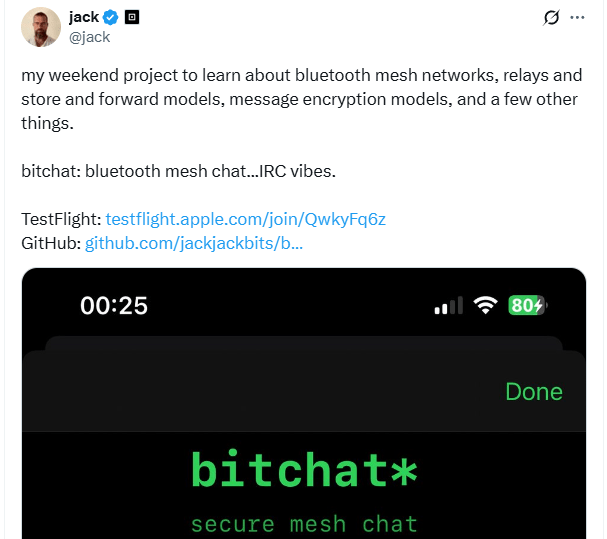
Jack Dorsey, co-founder and former CEO of Twitter, has quietly launched a new messaging platform called Bitchat, a decentralized app that enables peer-to-peer communication over Bluetooth mesh networks, without requiring internet, cellular service, or even phone numbers.
The app, which emphasizes privacy and censorship resistance, is now in beta and has already reached its 10,000-user cap on Apple's TestFlight.
The announcement came via Dorsey's personal account on X, where he revealed that the project had been built in just a few days. Despite its somewhat provocative name, Bitchat is a serious technical undertaking, clearly aligned with Dorsey's longstanding interest in decentralized and privacy-respecting technologies. While not directly built on Bitcoin, the app borrows from crypto-adjacent philosophies such as minimal trust, end-to-end encryption, and local-first design.

According to the project's GitHub repository, Bitchat is designed as a native iOS and macOS application that leverages Bluetooth Low Energy (BLE) to form mesh networks between nearby devices. The app uses automatic peer discovery and multi-hop message relaying, extending the typical Bluetooth range of ~100 meters up to roughly 300 meters through relayed transmissions. Messages can be passed along peers using a store-and-forward method, making it possible to reach users who aren't immediately within range, similar in spirit to delay-tolerant networks.
Feature-wise, Bitchat is unusually rich for an early-stage project. It offers:
- End-to-End Encryption using X25519 for key exchange and AES-256-GCM for message confidentiality.
- Channel-Based Messaging, with IRC-style commands for joining, moderating, and communicating in groups.
- No Registration Requirements, avoiding the need for emails, accounts, or even phone numbers.
- Emergency Privacy Features, such as a triple-tap wipe mechanism that clears all data instantly.
- Cover Traffic and Timing Obfuscation, designed to hinder metadata analysis and enhance anonymity.
The app also employs performance optimizations like LZ4 compression, adaptive battery-saving modes, and smart peer scanning that adapts based on device state. Messages larger than 100 bytes are compressed automatically, and device power mode influences both network scanning intensity and peer connection limits.
Currently, the app is limited to Apple platforms, but its underlying protocol is platform-agnostic. Android support is planned, and Dorsey confirmed on X that the message relay and store-and-forward logic already support longer-range transmission as users move between locations.
Given its ability to operate without traditional infrastructure, Bitchat could be a vital tool in situations where connectivity is limited or deliberately restricted, such as protests, festivals, or natural disasters.
However, potential users should be aware that Bluetooth mesh messaging has inherent range and scalability limits. It's ideal for clustered environments with dense peer presence but may not work reliably in isolated conditions unless relay chains are maintained. Moreover, while the app claims strong encryption, independent security audits have not yet been conducted, and early adopters should treat it as experimental.







TBH, I’m not sure I trust anything by the former CEO of Twitter. He didn’t exactly follow those “beliefs” when he ran Twitter. He was nothing but a Government stooge at that time. Why should I trust him now?
I want to tell my friend that CEO is a profession that requires profit, otherwise he will be pressured by the board of directors and have to do something he doesn’t like to fulfill his responsibilities. Now he has no pressure and can do everything he wants.
People’s thoughts and behaviors may not always remain the same, it just takes time!
I am in China, may God bless you.